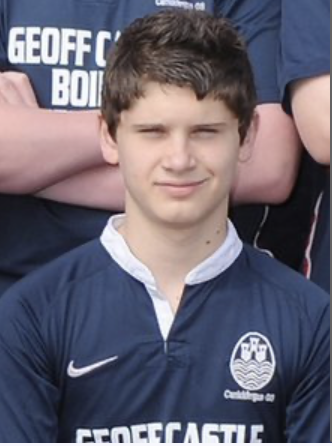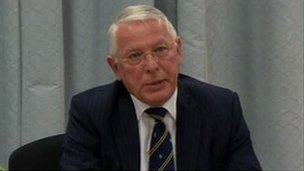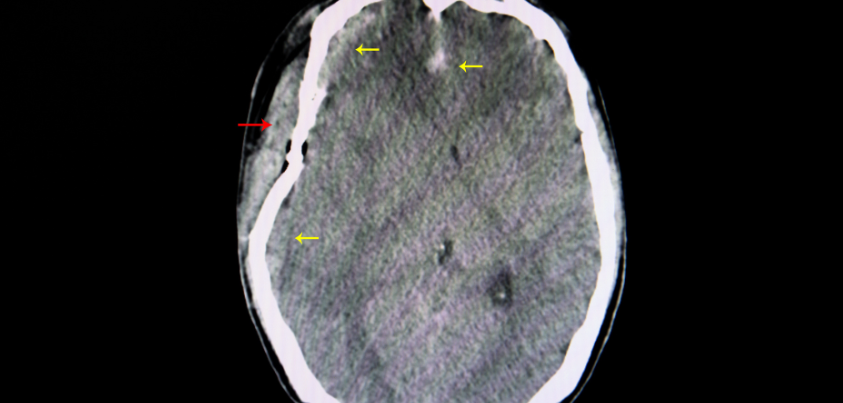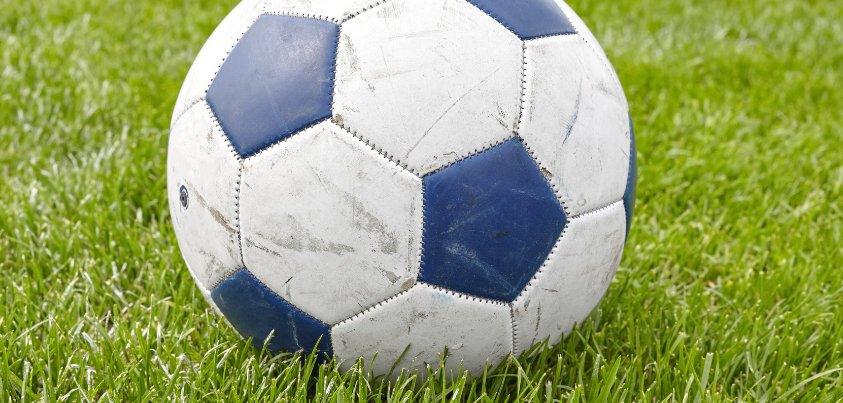
Benjamin Robinson died from a brain injury
If modern concussion guidelines had been applied before a teenage rugby player’s death he would be alive, his mother has said.
Benjamin Robinson, 14, died from a brain injury in Carrickfergus, County Antrim, in January last year.
He was checked for concussion several times during the game but his mother, Karen Walton, said the methods used were “antiquated”.
She was speaking at his inquest which has now been adjourned.
Mrs Walton said: “If the Pocket Scat guide had been applied, Ben would still be here.”
The International Rugby Board guide (Pocket SCAT2) for detecting symptoms of concussion and recommending simple tests was updated following Benjamin’s death and was recently drawn to referee David Brown’s attention.
Mrs Walton said: “You did not have knowledge of this guide that I can download and I can read, and I can stand at every school on a Saturday morning and give it out to every player.”
Pathologist Dr Jack Crane believes Ben died from Second Impact Syndrome brain swelling
According to his coach, Neal Kennedy, Benjamin was able to answer a series of questions testing mental function, including telling the Carrickfergus Grammar School teacher where he was, before his final collapse.
On Wednesday, Benjamin’s mother cross-examined referee Mr Brown about the game, during which her son was involved in a series of heavy tackles.
She asked him: “Is it possible that my son’s concussion has been missed because of the antiquated methods applied?”
Mr Brown said he could not say for sure if concussion had been missed.
He was only given the revised pocket guide listing symptoms of the condition a few weeks ago, although an earlier version of it had been available for several years.
The updated pamphlet includes a series of memory and balance tests but Mr Brown said some players could not pass the balance test before the start of the game, never mind following a heavy tackle.
Mrs Walton has argued that her son should have been taken off at half-time following a heavy challenge.
But one medical witness has said it was impossible to tell if he was concussed before he collapsed and another said he was only sure towards the end of the game when Mrs Walton shouted across to her son in concern because he appeared to be ailing and confused.
‘Mask symptoms’
The finger test of waving a digit in front of a player to check if he could follow it with his eyes was applied several times by coach Mr Kennedy to Benjamin.
However, another medical witness said that would reveal only very severe cases of concussion and it is not recommended by the latest guidance.
It may also be possible for players to mask symptoms because of the desire to stay on the pitch.
The inquest has heard calls from Benjamin’s coach for guidance to be more widely disseminated among players and coaches, and for concussion seminars to be made compulsory.
Mr Kennedy said this had implications for sports like hockey and Gaelic games as well.
Mr Brown added: “We as referees use what we have been given by the Ulster branch, and at the time of this particular game we were not issued with Scat and I was not aware of it.”
Benjamin played as centre for Carrickfergus Grammar against Dalriada School at his school’s ground.
State pathologist Jack Crane has said he died from Second Impact Syndrome, which causes swelling of the brain.
There is some evidence that children are more susceptible to it than adults because their brains cannot recover as well from a minor knock.
Mr Brown said Benjamin took a “big hit” earlier in the game but could not be sure if he had been stunned or dazed. He added: “It does take a minute or two to get your co-ordinates again.”
He described Benjamin as the “stand-out player” of the game.
“There was nothing in his demeanour that gave me any cause for concern,” he added.
The inquest has been adjourned and Carrickfergus Grammar School will seek more witnesses with a new police investigating officer after Benjamin’s family expressed concern about the original constable’s handling of the case.






